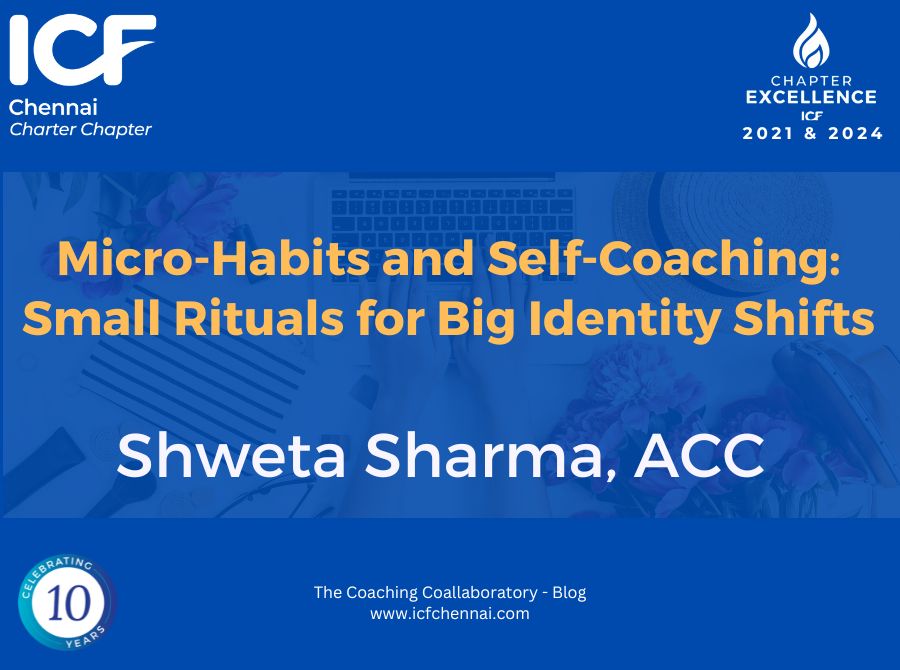Micro-Habits and Self-Coaching: Small Rituals for Big Identity Shifts

“Small daily improvements over time lead to stunning results.” — Robin Sharma
Blog by Shweta Sharma
Imagine a garden. Every day, a gardener comes out—not to transform the garden overnight, but to plant tiny seeds, pull a few weeds, and water just a little. At first, it looks like nothing changes. But after weeks and months, that garden becomes lush, vibrant, and alive in a way you couldn’t imagine from those small moments of daily care.
This is what happens when we use micro-habits—tiny, quick actions—to grow ourselves. And when we blend these micro-habits with self-coaching, we’re not just changing what we do but planting new seeds in the soil of who we are.
Micro-Habits: The Power of Small Drops
“Success is the sum of small efforts, repeated day in and day out.” — Robert Collier.
Think of a leaky faucet. One drop means nothing. But, left to drip, those drops can fill a cup, a bucket, or even overflow a sink by morning. Micro-habits are like these drops: brushing your teeth with your non-dominant hand, jotting one gratitude after lunch, or pausing for a single slow breath before answering the phone.
Alone, these actions seem too small to matter. But stacked together, every day, they become powerful enough to carve new rivers in our brain—shaping the person we become.
Self-Coaching: Becoming Your Quiet Guide
“Be careful how you talk to yourself because you are listening.” – James Clear
Imagine you have a wise, gentle friend who whispers reminders in your ear each morning, helping you see what’s possible. Self-coaching turns you into that friend. It’s not about giving yourself a pep talk once a year, but about checking in with a simple question, every day:
“What’s one small step I could take to be a little better today?” or “Who am I choosing to become right now?”
With self-coaching, you get to steer your own ship, no matter how stormy the sea. You become both the sailor and the compass.
Rituals that Transform Identity
“Your habits will determine your future.” — Jack Canfield
Let’s see how this works. Say you want to become someone who feels calm and grounded, not frazzled and rushed. You design a micro-habit: before your first sip of coffee, put your hand on your chest and take a slow, deep breath. You whisper to yourself: “I start my day with calm.”
Or, if you want to feel more confident, you ask yourself each night, “What was one thing I did bravely today?” and jot a word or two in a small notebook.
Each time you do these small rituals, it’s like watering a new part of your inner garden. At first, maybe nothing happens. But day after day, the roots grow deeper. Your self-image—the story you tell yourself—begins to shift. You’re no longer just doing different things. You’re becoming someone new.
Stacking Habits: Linking Old and New
“The secret of your future is hidden in your daily routine.” — Mike Murdock
You don’t have to add these habits to your already busy day. Like tying a balloon to a chair, you attach your new micro-habit to something you always do—your morning shower, turning doorknobs, brushing your teeth. This pairing helps your brain remember the action, and as weeks turn to months, the habit becomes as natural as breathing.
The 7-Day Challenge: Planting Seeds
“Don’t judge each day by the harvest you reap but by the seeds that you plant.” — Robert Louis Stevenson
Here’s a simple experiment. For one week, pick a self-coaching question: “How do I want to show up today?” Tie it to a daily event, like pouring tea. Answer it out loud or in your head. Watch how it feels by the end of the week.
Lasting change isn’t built in grand gestures, but in quiet, faithful repeats of the smallest action. Like a single seed, each micro-habit contains the blueprint of a forest. With self-coaching, you become both gardener and garden—growing, day by day, into who you’re meant to be.
“We are what we repeatedly do. Excellence, then, is not an act, but a habit.” — Aristotle
Shweta Sharma
The views and opinions expressed in guest posts featured on this blog are those of the author and do not necessarily reflect the opinions and views of the International Coach Federation (ICF). The publication of a guest post on the ICF Blog does not equate to an ICF endorsement or guarantee of the products or services provided by the author.
Additionally, for the purpose of full disclosure and as a disclaimer of liability, this content was possibly generated using the assistance of an AI program. Its contents, either in whole or in part, have been reviewed and revised by a human. Nevertheless, the reader/user is responsible for verifying the information presented and should not rely upon this article or post as providing any specific professional advice or counsel. Its contents are provided “as is,” and ICF makes no representations or warranties as to its accuracy or completeness and to the fullest extent permitted by applicable law specifically disclaims any and all liability for any damages or injuries resulting from use of or reliance thereupon.

